国际备用证惯例ISP98
- 格式:ppt
- 大小:167.50 KB
- 文档页数:28
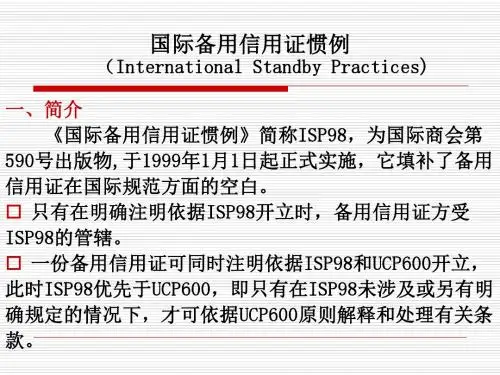
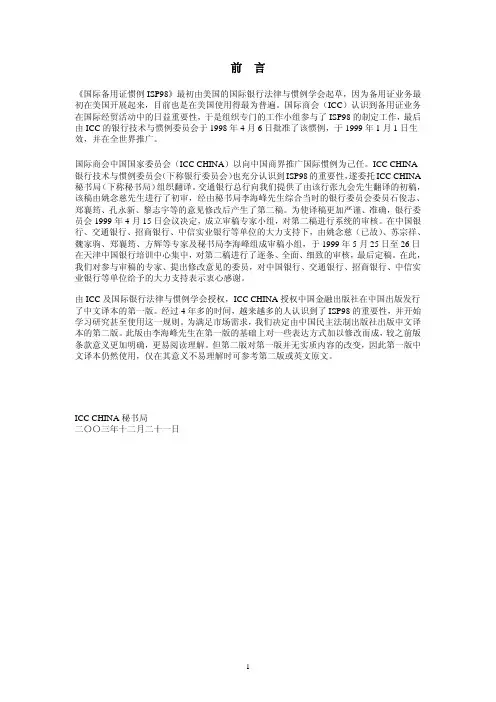
前言《国际备用证惯例ISP98》最初由美国的国际银行法律与惯例学会起草,因为备用证业务最初在美国开展起来,目前也是在美国使用得最为普遍。
国际商会(ICC)认识到备用证业务在国际经贸活动中的日益重要性,于是组织专门的工作小组参与了ISP98的制定工作,最后由ICC的银行技术与惯例委员会于1998年4月6日批准了该惯例,于1999年1月1日生效,并在全世界推广。
国际商会中国国家委员会(ICC CHINA)以向中国商界推广国际惯例为己任。
ICC CHINA 银行技术与惯例委员会(下称银行委员会)也充分认识到ISP98的重要性,遂委托ICC CHINA 秘书局(下称秘书局)组织翻译。
交通银行总行向我们提供了由该行张九会先生翻译的初稿,该稿由姚念慈先生进行了初审,经由秘书局李海峰先生综合当时的银行委员会委员石俊志、郑襄筠、孔永新、黎志宇等的意见修改后产生了第二稿。
为使译稿更加严谨、准确,银行委员会1999年4月15日会议决定,成立审稿专家小组,对第二稿进行系统的审核。
在中国银行、交通银行、招商银行、中信实业银行等单位的大力支持下,由姚念慈(已故)、苏宗祥、魏家驹、郑襄筠、方辉等专家及秘书局李海峰组成审稿小组,于1999年5月25日至26日在天津中国银行培训中心集中,对第二稿进行了逐条、全面、细致的审核,最后定稿。
在此,我们对参与审稿的专家、提出修改意见的委员,对中国银行、交通银行、招商银行、中信实业银行等单位给予的大力支持表示衷心感谢。
由ICC及国际银行法律与惯例学会授权,ICC CHINA授权中国金融出版社在中国出版发行了中文译本的第一版。
经过4年多的时间,越来越多的人认识到了ISP98的重要性,并开始学习研究甚至使用这一规则。
为满足市场需求,我们决定由中国民主法制出版社出版中文译本的第二版。
此版由李海峰先生在第一版的基础上对一些表达方式加以修改而成,较之前版条款意义更加明确,更易阅读理解。
但第二版对第一版并无实质内容的改变,因此第一版中文译本仍然使用,仅在其意义不易理解时可参考第二版或英文原文。
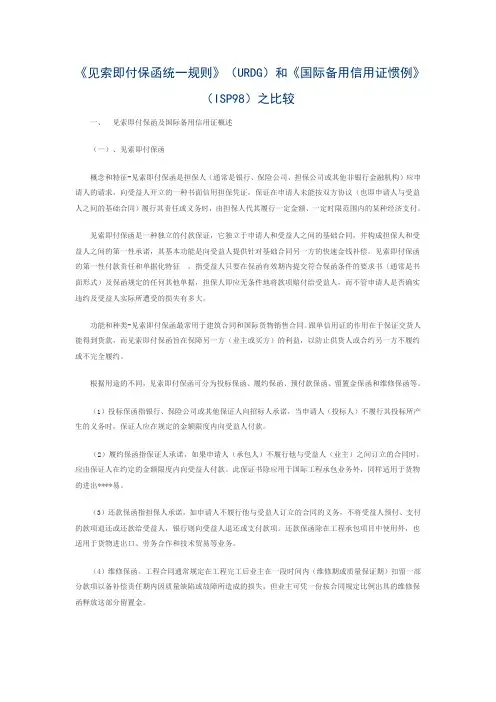
《见索即付保函统一规则》(URDG)和《国际备用信用证惯例》(ISP98)之比较一、见索即付保函及国际备用信用证概述(一)、见索即付保函概念和特征-见索即付保函是担保人(通常是银行、保险公司、担保公司或其他非银行金融机构)应申请人的请求,向受益人开立的一种书面信用担保凭证,保证在申请人未能按双方协议(也即申请人与受益人之间的基础合同)履行其责任或义务时,由担保人代其履行一定金额、一定时限范围内的某种经济支付。
见索即付保函是一种独立的付款保证,它独立于申请人和受益人之间的基础合同,并构成担保人和受益人之间的第一性承诺,其基本功能是向受益人提供针对基础合同另一方的快速金钱补偿。
见索即付保函的第一性付款责任和单据化特征,指受益人只要在保函有效期内提交符合保函条件的要求书(通常是书面形式)及保函规定的任何其他单据,担保人即应无条件地将款项赔付给受益人,而不管申请人是否确实违约及受益人实际所遭受的损失有多大。
功能和种类-见索即付保函最常用于建筑合同和国际货物销售合同。
跟单信用证的作用在于保证交货人能得到货款,而见索即付保函旨在保障另一方(业主或买方)的利益,以防止供货人或合约另一方不履约或不完全履约。
根据用途的不同,见索即付保函可分为投标保函、履约保函、预付款保函、留置金保函和维修保函等。
(1)投标保函指银行、保险公司或其他保证人向招标人承诺,当申请人(投标人)不履行其投标所产生的义务时,保证人应在规定的金额限度内向受益人付款。
(2)履约保函指保证人承诺,如果申请人(承包人)不履行他与受益人(业主)之间订立的合同时,应由保证人在约定的金额限度内向受益人付款。
此保证书除应用于国际工程承包业务外,同样适用于货物的进出****易。
(3)还款保函指担保人承诺,如申请人不履行他与受益人订立的合同的义务,不将受益人预付、支付的款项退还或还款给受益人,银行则向受益人退还或支付款项。
还款保函除在工程承包项目中使用外,也适用于货物进出口、劳务合作和技术贸易等业务。
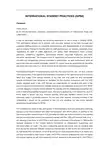
INTERNATIONAL STANDBY PRACTICES (ISP98) ForewordPROLOGUEby Dr. Gerold Herrmann, Secretary, United Nations Commission on International Trade Law (UNCITRAL)It was an extremely interesting and enriching experience for me to assist in drafting ISP98. This participation allowed me to witness (and now bear witness to) the very thorough and pragmatic drafting process in a superbly selected group, with representatives of all interested sectors actively involved in standby letter of credit practice such as: bankers, especially those responsible for letter of credit operations and global trade transactions, bank counsel, attorneys, academics, regulators, government officials, corporate treasurers, and likely influential beneficiaries. The treasure trove of experience and expertise and the diversity of interests and perspectives proved invaluable in determining- as was continuously done by examining concrete practical examples- whether on a given issue an operational rule would be desirable and useful and, if so, which solution would work best and reflect good practice.Continued participation in the preparatory work has also convinced me- as, I am sure, it would have anyone else- of the special characteristics of standbys at the operational level of practical detail and usage. Their special features, in my view, not only justify but also necessitate special contractual rules designed for standbys. As the constant comparison with the UCP clearly revealed, quite a few UCP Articles are inappropriate for standbys and quite a few issues of paramount importance in standby practice are not addressed at all in the UCP. While a similar disparity in practice exists between the standby and the independent guarantee (the bank or demand guarantee European style), this seems particularly, if not exclusively, true for those types of actual use (e.g. financial standby, direct-pay standby) hitherto found only extremely rarely in guarantee practice. For this and other reasons, including firmness of the undertaking, I would not be surprised to see not only standbys but also some demand guarantees issued subject to ISP98.For a professional unifier of law, participation in the preparatory work was particularly satisfying because of its interconnection with other harmonisation and reform efforts. In addition to the concordance with revised Article 5 UCC (the letter-of-credit law of the homeland of the standby) and the similarly close contact (and personal overlap) with the 1993 UCP revision task force, I am referring in particular to UNCITRAL's work which culminated in the adoption in 1995 by the General Assembly of the "United Nations Convention on Independent Guarantees and Stand-by Letters of Credit." The idea of preparing special operational rules for standbys was born during the extensive debates comparing national laws as well as the two instruments to be married by that Convention. Since bride and groom were presented there in all facets and critically scrutinized by their future in-laws, UNCITRAL's travaux preparatoires make for highly informative reading (as will future abstracts of court decisions to be published in UNCITRAL'scase collection system called CLOUT; homepage: www.un.or.at/uncitral). It was gratifying to see the group preparing ISP98 refer continuously to the UNCITRAL Convention in order to ensure complete consistency. I must admit to special gratification by overhearing one of the world's leading letter of credit expert's remark to his banking colleague: "The more I look at this UN Convention, the more I really like it."The above coordination or cooperation in the universal harmonisation and modernization efforts is welcome and in fact crucial because of the (often neglected or ignored) interdependence between the two very different levels of legal norms: the contractual level, where such sets of rules like ISP98, UCP 500, or URDG become effective by agreement of the individual parties, and the statutory level, where internationally elaborated law like the UN Convention or domestic law (e.g. Art. 5 UCC) recognise and give full effect to the exercise of that party autonomy and regulate certain issues that can effectively be settled only at that level (e.g. standards of fraud exception, injunctive relief and other court matters). Therefore, ISP98 and the Convention supplement each other in an ideal manner and together lay the necessary basis for a smooth functioning of standby practice worldwide.PrefaceThe International Standby Practices (ISP98) reflects generally accepted practice, custom, and usage of standby letters of credit. It provides separate rules for standby letters of credit in the same sense that the Uniform Customs and Practice for Documentary Credits (UCP) and the Uniform Rules for Demand Guarantees (URDG) do for commercial letters of credit and independent bank guarantees.The formulation of standby letter of credit practices in separate rules evidences the maturity and importance of this financial product. The amounts outstanding of standbys greatly exceed the outstanding amounts of commercial letters of credit. While the standby is associated with the United States where it originated and where it is most widely used, it is truly an international product. Non-U.S. bank outstandings have exceeded those of U.S. banks in the United States alone. Moreover, the standby is used increasingly throughout the world.For convenience, standbys are commonly classified descriptively (and without operative significance in the application of these Rules) based on their function in the underlying transaction or other factors not necessarily related to the terms and conditions of the standby itself. For example:ll A "Performance Standby" supports an obligation to perform other than to pay money including for the purpose of covering losses arising from a default of the applicant in completion of the underlying transactions.l An "Advance Payment Standby" supports an obligation to account for an advance payment made by the beneficiary to the applicant.l A "Bid Bond/Tender Bond Standby" supports an obligation of the applicant to execute a contract if the applicant is awarded a bid.l A "Counter Standby" supports the issuance of a separate standby or other undertaking by the beneficiary of the counter standby.l A "Financial Standby" supports an obligation to pay money, including any instrument evidencing an obligation to repay borrowed money.l A "Direct Pay Standby" supports payment when due of an underlying payment obligation typically in connection with a financial standby without regard to a default.l An "Insurance Standby" supports an insurance or reinsurance obligation of the applicant.l A "Commercial Standby" supports the obligations of an applicant to pay for goods or services in the event of non-payment by other methods.In the past, many standbys have been issued subject to the UCP even though it was intended for commercial letters of credit. The UCP reinforced the independence and documentary character of the standby. It also provided standards for examination and notice of dishonor and a basis to resist market pressures to embrace troublesome practices such as the issuance of standbys without expiration dates.Despite these important contributions, it has long been apparent that the UCP was not fully applicable nor appropriate for standbys, as is recognized in UCP 500 Article 1 which provides that it applies to the extent to which they may be applicable. Even the least complex standbys (those calling for presentation of a draft only) pose problems not addressed by the UCP. More complex standbys (those involving longer terms or automatic extensions, transfer on demand, requests that the beneficiary issue its own undertaking to another, and the like) require more specialized rules of practice. The ISP fills these needs.The ISP differs from the UCP in style and approach because it must receive acceptance not only from bankers and merchants, but also from a broader range of those actively involved in standby law and practice corporate treasurers and credit managers, rating agencies, government agencies and regulators, and indenture trustees as well as their counsel. Because standbys are often intended to be available in the event of disputes or applicant insolvency, their texts are subject to a degree of scrutiny not encountered in the commercial letter of credit context. As a result, the ISP is also written to provide guidance to lawyers and judges in the interpretation of standby practice.Differences in substance result either from different practices, different problems, or the need for more precision. In addition, the ISP proposes basic definitions should the standby permit or require presentation of documents by electronic means. Since standbys infrequently require presentation of negotiable documents, standby practice is currently more conducive to electronic presentations, and the ISP provides definitions and rules encouraging such presentations. The development of S.W.I.F.T. message types for the ISP is anticipated.The ISP, like the UCP for commercial letters of credit, simplifies, standardizes, and streamlines the drafting of standbys, and provides clear and widely accepted answers to common problems. There are basic similarities with the UCP because standby and commercial practices are fundamentally the same. Even where the rules overlap, however, the ISP is more precise, stating the intent implied in the UCP rule, in order to make the standby more dependable when a drawing or honor is questioned.Like the UCP and the URDG, the ISP will apply to any independent undertaking issued subject to it. This approach avoids the impractical and often impossible task of identifying and distinguishing standbys from independent guarantees and, in many cases, commercial letters of credit. The choice of which set of rules to select is, therefore, left to the parties as it should be. One may well choose to use the ISP for certain types of standbys, the UCP for others, and the URDG for still others. While the ISP is not intended to be used for dependent undertakings such as accessory guarantees and insurance contracts, it may be useful in some situations inindicating that a particular undertaking which might otherwise be treated as dependent under local law is intended to be independent.For the ISP to apply to a standby, an undertaking should be made subject to these Rules by including language such as (but not limited to):l This undertaking is issued subject to the International Standby Practices 1998.orl Subject to ISP98.Although the ISP can be varied by the text of a standby, it provides neutral rules acceptable in the majority of situations and a useful starting point for negotiations in other situations. It will save parties (including banks that issue, confirm, or are beneficiaries of standbys) considerable time and expense in negotiating and drafting standby terms.The ISP is designed to be compatible with the United Nations Convention on Independent Guarantees and Stand-by Letters of Credit (which represents a useful and practical formulation of basic standby and independent guarantee law) and also with local law, whether statutory or judicial, and to embody standby letter of credit practice under that law. If these rules conflict with mandatory law on issues such as assignment of proceeds or transfer by operation of law, applicable law will, of course, control. Nonetheless, most of these issues are rarely addressed by local law and progressive commercial law will often look to the practice as recorded in the ISP for guidance in such situations, especially with respect to cross border under-takings. As a result, it is expected that the ISP will complement local law rather than conflict with it.The ISP is intended to be used also in arbitration as well as judicial proceedings (such as the expert based letter of credit arbitration system developed by the International Center for Letter of Credit Arbitration (ICLOCA) Rules or general commercial ICC arbitration) or with alternative methods of dispute resolution. Such a choice should be made expressly and with appropriate detail. At a minimum, it can be made in connection with the clause relating to ISP98 - e.g. This undertaking is issued subject to ISP98, and all disputes arising out of it or related to it are subject to arbitration under ICLOCA Rules (1996).Although translations of the ISP into other languages are envisioned and will be monitored for integrity, the English text is the official text of the ISP in the event of disputes.The ISP is the product of the work of the ISP Working Group under the auspices of the Institute of International Banking Law and Practice, Inc. which interacted with hundreds of persons over a five year period, and has benefited from comments received from individuals, banks, and national and international associations. In particular, the participation of the International Financial Services Association (formerly the USCIB) and the Ad Hoc Working Group under the chairmanship of Gary Collyer (which led to its endorsement by the ICC Banking Commission) is gratefully recognized. In addition, the sponsorship and support of Citibank N.A., The Chase Manhattan Bank, ABN-AMRO, Baker and McKenzie, and the National Law Center for Inter-American Free Trade is acknowledged. Perhaps the greatest significance of the ISP is that its creation marks a new chapter in the collaboration between the international banking operations community and the legal community at an international level. In this respect, the active role played in this process by the Secretariat of the United Nations Commission on International Trade Law has been invaluable.The ISP is drafted as a set of rules intended for use in daily practice. It is not intended toprovide introductory information on standbys and their uses. While it is recognized that specific rules would benefit from explanatory comments, such comments are not appended to the ISP because the resulting work would be too cumbersome for daily use. Instead, introductory materials and Official Comments are available in the Official Commentary on the International Standby Practices (ISP98). For further information on support materials and developments on the ISP and to pose queries, consult the ISP98 website: .Professor James E. ByrneDirector, Institute of International Banking Law and Practice, Inc.; Chair and Reporter, P Working GroupJames G. BarnesBaker and McKenzie; Vice Chair, ISP Working GroupGary W. CollyerVice President, Citibank, N.A; Chair, ICC Ad Hoc Working Group and Technical Adviser to the ICC Banking Commission1. GENERAL PROVISIONSScope, Application, Definitions, and Interpretation of These Rules1.01 Scope and Applicationa. These Rules are intended to be applied to standby letters of credit (including performance, financial, and direct pay standby letter of credit)b. A standby letter of credit or other similar undertaking, however named or described, whether for domestic or international use, may be made subject to these Rules by express reference to them.c. An undertaking subject to these Rules may expressly modify or exclude their application.d. An undertaking subject to these Rules is hereinafter referred to as a "standby".1.02 Relationship to Law and Other Rulesa. These Rules supplement the applicable law to the extent not prohibited by that law.b. These Rules supersede conflicting provisions in any other rules of practice to which a standby letter of credit is also made subject.1.03 Interpretative PrinciplesThese Rules shall be interpreted as mercantile usage with regard for:a. integrity of standbys as reliable and efficient undertakings to payb. practice and terminology of banks and businesses in day-to-day transactionsc. consistency within the worldwide system of banking operations and commerce; andd. worldwide uniformity in their interpretation and application.。
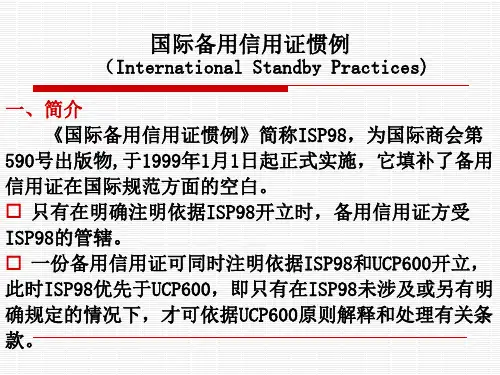
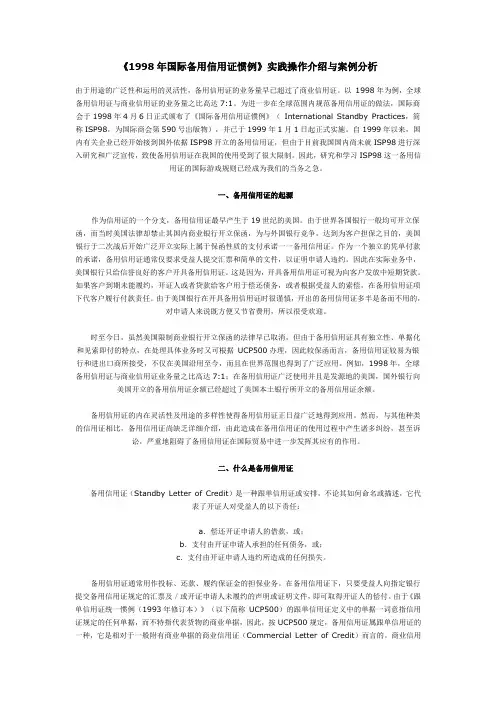
《1998年国际备用信用证惯例》实践操作介绍与案例分析由于用途的广泛性和运用的灵活性,备用信用证的业务量早已超过了商业信用证。
以1998年为例,全球备用信用证与商业信用证的业务量之比高达7:1。
为进一步在全球范围内规范备用信用证的做法,国际商会于1998年4月6日正式颁布了《国际备用信用证惯例》(International Standby Practices,简称ISP98,为国际商会第590号出版物),并已于1999年1月1日起正式实施。
自1999年以来,国内有关企业已经开始接到国外依据ISP98开立的备用信用证,但由于目前我国国内尚未就ISP98进行深入研究和广泛宣传,致使备用信用证在我国的使用受到了很大限制。
因此,研究和学习ISP98这一备用信用证的国际游戏规则已经成为我们的当务之急。
一、备用信用证的起源作为信用证的一个分支,备用信用证最早产生于19世纪的美国。
由于世界各国银行一般均可开立保函,而当时美国法律却禁止其国内商业银行开立保函,为与外国银行竞争,达到为客户担保之目的,美国银行于二次战后开始广泛开立实际上属于保函性质的支付承诺一一备用信用证。
作为一个独立的凭单付款的承诺,备用信用证通常仅要求受益人提交汇票和简单的文件,以证明申请人违约。
因此在实际业务中,美国银行只给信誉良好的客户开具备用信用证。
这是因为,开具备用信用证可视为向客户发放中短期贷款。
如果客户到期未能履约,开证人或者贷款给客户用于偿还债务,或者根据受益人的索偿,在备用信用证项下代客户履行付款责任。
由于美国银行在开具备用信用证时很谨慎,开出的备用信用证多半是备而不用的,对申请人来说既方便又节省费用,所以很受欢迎。
时至今日,虽然美国限制商业银行开立保函的法律早已取消,但由于备用信用证具有独立性、单据化和见索即付的特点,在处理具体业务时又可根据UCP500办理,因此较保函而言,备用信用证较易为银行和进出口商所接受,不仅在美国沿用至今,而且在世界范围也得到了广泛应用。
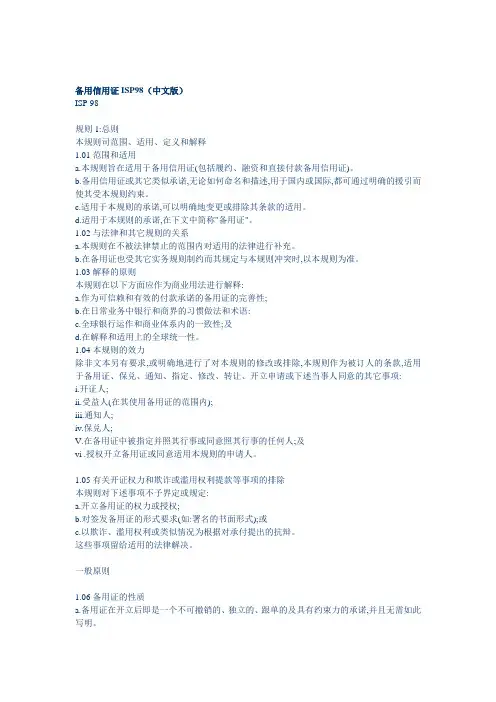
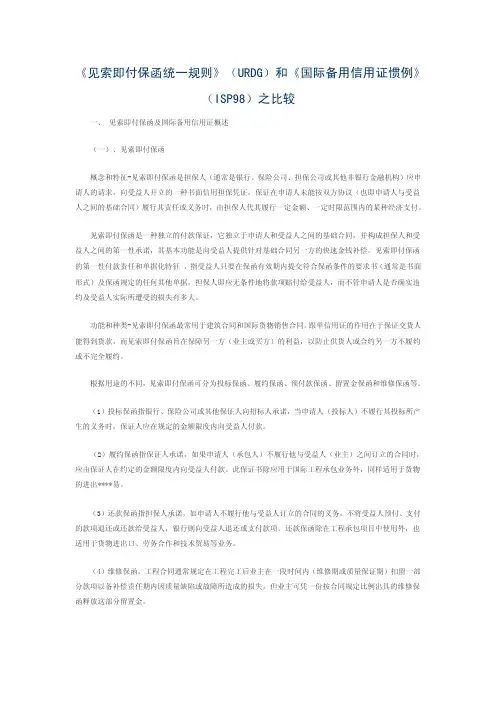
《见索即付保函统一规则》(URDG)和《国际备用信用证惯例》(ISP98)之比较一、见索即付保函及国际备用信用证概述(一)、见索即付保函概念和特征-见索即付保函是担保人(通常是银行、保险公司、担保公司或其他非银行金融机构)应申请人的请求,向受益人开立的一种书面信用担保凭证,保证在申请人未能按双方协议(也即申请人与受益人之间的基础合同)履行其责任或义务时,由担保人代其履行一定金额、一定时限范围内的某种经济支付。
见索即付保函是一种独立的付款保证,它独立于申请人和受益人之间的基础合同,并构成担保人和受益人之间的第一性承诺,其基本功能是向受益人提供针对基础合同另一方的快速金钱补偿。
见索即付保函的第一性付款责任和单据化特征,指受益人只要在保函有效期内提交符合保函条件的要求书(通常是书面形式)及保函规定的任何其他单据,担保人即应无条件地将款项赔付给受益人,而不管申请人是否确实违约及受益人实际所遭受的损失有多大。
功能和种类-见索即付保函最常用于建筑合同和国际货物销售合同。
跟单信用证的作用在于保证交货人能得到货款,而见索即付保函旨在保障另一方(业主或买方)的利益,以防止供货人或合约另一方不履约或不完全履约。
根据用途的不同,见索即付保函可分为投标保函、履约保函、预付款保函、留置金保函和维修保函等。
(1)投标保函指银行、保险公司或其他保证人向招标人承诺,当申请人(投标人)不履行其投标所产生的义务时,保证人应在规定的金额限度内向受益人付款。
(2)履约保函指保证人承诺,如果申请人(承包人)不履行他与受益人(业主)之间订立的合同时,应由保证人在约定的金额限度内向受益人付款。
此保证书除应用于国际工程承包业务外,同样适用于货物的进出****易。
(3)还款保函指担保人承诺,如申请人不履行他与受益人订立的合同的义务,不将受益人预付、支付的款项退还或还款给受益人,银行则向受益人退还或支付款项。
还款保函除在工程承包项目中使用外,也适用于货物进出口、劳务合作和技术贸易等业务。
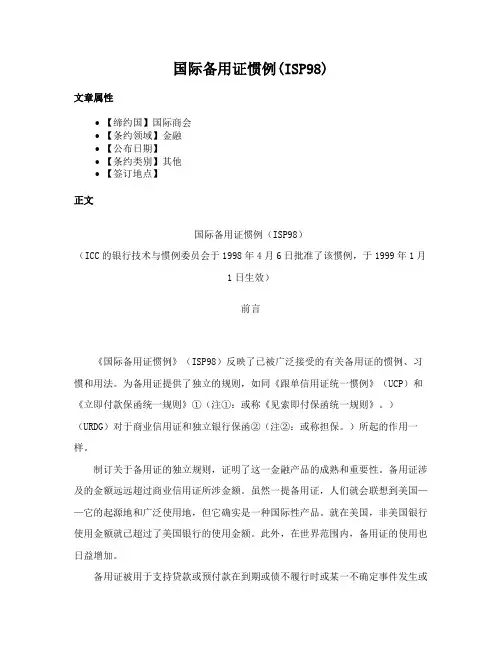
国际备用证惯例(ISP98)文章属性•【缔约国】国际商会•【条约领域】金融•【公布日期】•【条约类别】其他•【签订地点】正文国际备用证惯例(ISP98)(ICC的银行技术与惯例委员会于1998年4月6日批准了该惯例,于1999年1月1日生效)前言《国际备用证惯例》(ISP98)反映了已被广泛接受的有关备用证的惯例、习惯和用法。
为备用证提供了独立的规则,如同《跟单信用证统一惯例》(UCP)和《立即付款保函统一规则》①(注①:或称《见索即付保函统一规则》。
)(URDG)对于商业信用证和独立银行保函②(注②:或称担保。
)所起的作用一样。
制订关于备用证的独立规则,证明了这一金融产品的成熟和重要性。
备用证涉及的金额远远超过商业信用证所涉金额。
虽然一提备用证,人们就会联想到美国——它的起源地和广泛使用地,但它确实是一种国际性产品。
就在美国,非美国银行使用金额就已超过了美国银行的使用金额。
此外,在世界范围内,备用证的使用也日益增加。
备用证被用于支持贷款或预付款在到期或债不履行时或某一不确定事件发生或不发生时产生的义务的履行。
出于方便考虑,根据在基础交易中备用证的不同作用以及一些不一定涉及备用证自身条款的其他因素,通常对备用证进行描述性的分类(这些分类对本规则的适用并不产生操作的影响)。
例如:“履约备用证”——支持一项非款项支付的履约义务,包括对由于申请人在基础交易中不履约所致损失的赔偿。
“预付款备用证”——支持申请人收到受益人预付款后所承担的义务。
“招标/投标备用证”——支持申请人中标后执行合同的义务。
“对开备用证③(注③:或称反担保备用证(counter standby)。
)”——支持对开备用证受益人所开立的另外的备用证或其他承诺。
“融资备用证”——支持付款义务,包括对借款的偿还义务的任何证明性文件。
“直接付款备用证”——基本上是支持一项与融资备用证有关的基础付款义务到期付款,而不论是否涉及债不履行。
“保险备用证”——支持申请人的保险或再保险义务。
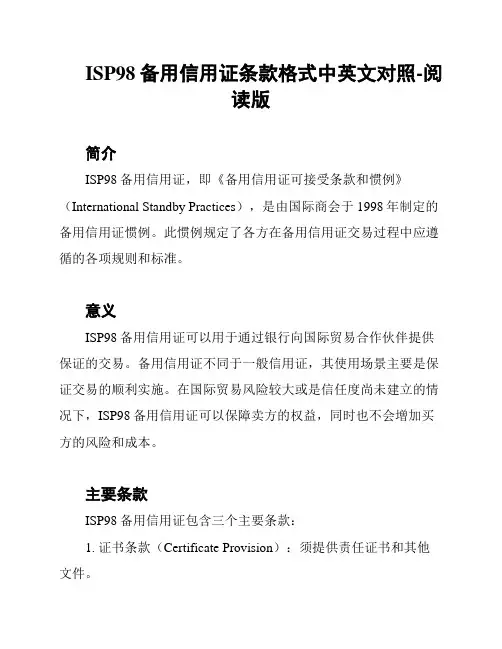
ISP98备用信用证条款格式中英文对照-阅
读版
简介
ISP98备用信用证,即《备用信用证可接受条款和惯例》(International Standby Practices),是由国际商会于1998年制定的备用信用证惯例。
此惯例规定了各方在备用信用证交易过程中应遵循的各项规则和标准。
意义
ISP98备用信用证可以用于通过银行向国际贸易合作伙伴提供保证的交易。
备用信用证不同于一般信用证,其使用场景主要是保证交易的顺利实施。
在国际贸易风险较大或是信任度尚未建立的情况下,ISP98备用信用证可以保障卖方的权益,同时也不会增加买方的风险和成本。
主要条款
ISP98备用信用证包含三个主要条款:
1. 证书条款(Certificate Provision):须提供责任证书和其他文件。
2. 要求条款(Demand Provision):要求银行提供责任和契约证书。
3. 能力条款(Ability Provision):银行提供证明其存在提供任何有关信用证保证的能力。
格式
ISP98备用信用证的格式包含多个部分,包括:
1. 正文部分
2. 附件部分
3. 表格部分
此文档为ISP98备用信用证条款格式中英文对照阅读版,其中对照了主要条款和格式要求,需要注意的是具体条款应根据具体情况和交易双方约定而定。
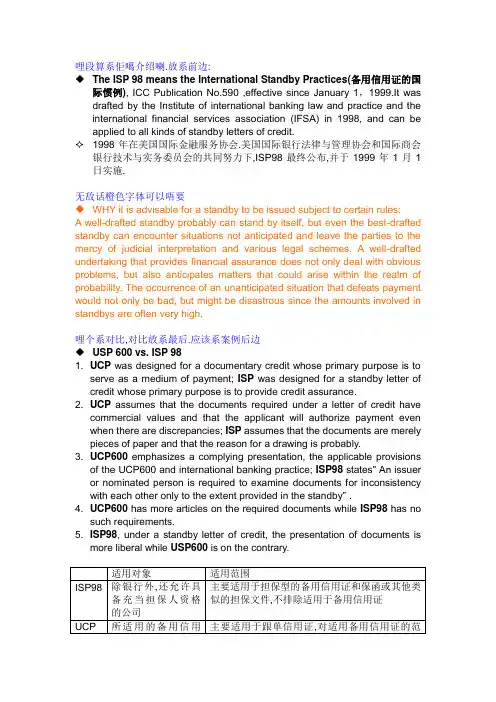
哩段算系佢噶介绍喇.放系前边:◆The ISP 98 means the International Standby Practices(备用信用证的国际惯例),ICC Publication No.590 ,effective since January 1,1999.It was drafted by the Institute of international banking law and practice and the international financial services association (IFSA) in 1998, and can be applied to all kinds of standby letters of credit.✧1998年在美国国际金融服务协会.美国国际银行法律与管理协会和国际商会银行技术与实务委员会的共同努力下,ISP98最终公布,并于1999年1月1日实施.无敌话橙色字体可以唔要◆WHY it is advisable for a standby to be issued subject to certain rules:A well-drafted standby probably can stand by itself, but even the best-drafted standby can encounter situations not anticipated and leave the parties to the mercy of judicial interpretation and various legal schemes. A well-drafted undertaking that provides financial assurance does not only deal with obvious problems, but also anticipates matters that could arise within the realm of probability. The occurrence of an unanticipated situation that defeats payment would not only be bad, but might be disastrous since the amounts involved in standbys are often very high.哩个系对比,对比放系最后.应该系案例后边◆USP 600 vs. ISP 981. UCP was designed for a documentary credit whose primary purpose is toserve as a medium of payment; ISP was designed for a standby letter of credit whose primary purpose is to provide credit assurance.2. UCP assumes that the documents required under a letter of credit havecommercial values and that the applicant will authorize payment even when there are discrepancies; ISP assumes that the documents are merely pieces of paper and that the reason for a drawing is probably.3. UCP600 emphasizes a complying presentation, the applicable provisionsof the UCP600 and international banking practice; ISP98 states” An issuer or nominated person is required to examine documents for inconsistency with each other only to the extent provided in the standby” .4. UCP600 has more articles on the required documents while ISP98 has nosuch requirements.5. ISP98, under a standby letter of credit, the presentation of documents ismore liberal while USP600 is on the contrary.超前、更明确.因此,尽管有的备用信用证格式上已印就适用于UCP500,但只要备用信用证同时加注适用于ISP98(“This undert aking is issued subject to International Standby Practices,ISP98”),则ISP98优先于UCP500.无敌话橙色字体可以唔要◆Advantage:The great advantage of rules is that they provide well-trodden paths that limit the amount of thought and work otherwise required for any given transaction. Being known, they can either be accepted or rejected or modified. As a result, they make transactions simpler, less expensive, and less troublesome.。
UCP500 与ISP98 有关转让的规则之比较债的移转是指不变更债的内容,而将债由原主体移转于他主体的一种法律行为。
依移转的内容为标准,可将债的移转分为概括承受和特定承受。
前者是指将债权债务一并移转;后者是指债权或债务的单独移转,即债权让与和债务承担。
信用证的转让属于债的移转,其中,商业信用证的转让通常是债权债务的概括承受,第一受益人将其在信用证项下依证供货的义务和支款的权利一并让与第二受益人。
备用信用证的转让主要是债权的让与,即支款权的让与,因为备用信用证项下受益人主要是债权的享有者,履行交单义务的过程就是实现支款权的过程。
商业信用证与备用信用证的转让均涉及了申请人、开证人、受益人和受让人之间复杂的法律关系,为理清这些关系,顺利地实行转让、解决争议,需要明确的法律规则做为指导。
但是如果信用证当事人各依所在地法律及习惯解释信用证当事人之间的法律关系,那么势必得出不同的结论,给信用证交易的顺利进行带来巨大障碍。
统一的国际信用证惯例因此而产生,为信用证业务的开展提供统一而细致的规则。
UCP500 和ISP98便是有关商业信用证和备用信用证的主要国际惯例,在实践中得到了普遍适用。
UCP 主要是为商业信用证而制定的,自1933 年产生以后,随着国际贸易的发展,特别是运输技术的发展,经历了多次修订,最近的一次是在1993 年,从而产生了现在普遍适用的UCP500。
UCP500 反映了当前国际贸易中涉及的银行、进出口商的习惯做法和操作规则,成为了银行办理信用证业务的一项基本的统一规则,进出口商选择适用的主要的国际惯例。
UCP 除了主要适用于商业信用证以外,还部分地适用于备用信用证。
在ISP98产生以前,许多备用证都是按UCP 开立的。
然而实践证明,UCP 对备用证不能完全适用,也不适合,即使最不复杂的备用证(只要求提示一张汇票) 提出的问题,在UCP 中都未涉及到。
更复杂的备用证,诸如要求转让,就需要更加专门的行为规则(国际备用证惯例ISP98) 。
INTERNATIONAL STANDBY PRACTICES (ISP98)1. GENERAL PROVISIONSScope, Application, Definitions, and Interpretation of These Rules1.01 Scope and Applicationa. These Rules are intended to be applied to standby letters of credit (including performance, financial, and direct pay standby letter of credit)b. A standby letter of credit or other similar undertaking, however named or described, whether for domestic or international use, may be made subject to these Rules by express reference to them.c. An undertaking subject to these Rules may expressly modify or exclude their application.d. An undertaking subject to these Rules is hereinafter referred to as a "standby".1.02 Relationship to Law and Other Rulesa. These Rules supplement the applicable law to the extent not prohibited by that law.b. These Rules supersede conflicting provisions in any other rules of practice to which a standby letter of credit is also made subject.1.03 Interpretative PrinciplesThese Rules shall be interpreted as mercantile usage with regard for:a. integrity of standbys as reliable and efficient undertakings to payb. practice and terminology of banks and businesses in day-to-day transactionsc. consistency within the worldwide system of banking operations and commerce; andd. worldwide uniformity in their interpretation and application.1.04 Effect of the RulesUnless the context otherwise requires, or unless expressly modified or excluded, these Rules apply as terms and conditions incorporated into a standby, confirmation, advice, nomination, amendment, transfer, request for issuance, or other agreement of: 规则1:总则本规则司范围、适用、定义和解释1.01范围和适用a.本规则旨在适用于备用信用证(包括履约、融资和直接付款备用信用证)。
The International Standby Practices - ISP98 1998备用信用证统一惯例总则范围、适用、定义和解释1.01范围和适用a.本规则旨在适用于备用信用证(包括履约、融资和直接付款备用信用证)。
b.备用信用证或其它类似承诺,无论如何命名和描述,用于国内或国际,都可通过明确的援引而使其受本规则约束。
c.适用于本规则的承诺,可以明确地变更或排除其条款的适用。
d.适用于本规则的承诺,在下文中简称"备用证"。
1.02与法律和其它规则的关系a.本规则在不被法律禁止的范围内对适用的法律进行补充。
b.在备用证也受其它实务规则制约而其规定与本规则冲突时,以本规则为准。
1.03解释的原则本规则在以下方面应作为商业用法进行解释:a.作为可信赖和有效的付款承诺的备用证的完善性;b.在日常业务中银行和商界的习惯做法和术语:c.全球银行运作和商业体系内的一致性;及d.在解释和适用上的全球统一性。
1.04本规则的效力除非文本另有要求,或明确地进行了对本规则的修改或排除,本规则作为被订人的条款,适用于备用证、保兑、通知、指定、修改、转让、开立申请或下述当事人同意的其它事项:i.开证人;ii.受益人(在其使用备用证的范围内);iii.通知人;iv.保兑人;V.在备用证中被指定并照其行事或同意照其行事的任何人;及vi .授权开立备用证或同意适用本规则的申请人。
1.05有关开证权力和欺诈或滥用权利提款等事项的排除本规则对下述事项不予界定或规定:a.开立备用证的权力或授权;b.对签发备用证的形式要求(如:署名的书面形式);或c.以欺诈、滥用权利或类似情况为根据对承付提出的抗辩。
这些事项留给适用的法律解决。
一般原则1.06备用证的性质a.备用证在开立后即是一个不可撤销的、独立的、跟单的及具有约束力的承诺,并且无需如此写明。
b.因为备用证是不可撤销的,除非在备用证中另有规定,或经对方当事人同意,开证人不得修改或撤销其在该备用证下之义务。